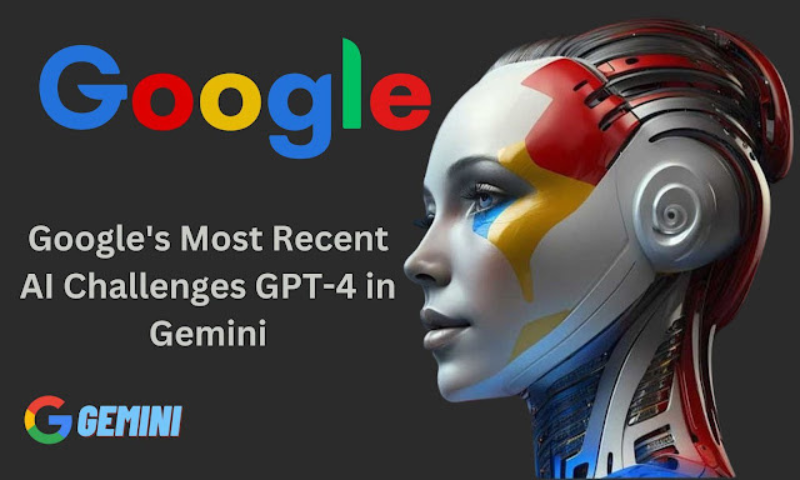Introduction
In the ever-evolving realm of Artificial Intelligence (AI), Google has consistently been at the forefront of groundbreaking innovations. With the recent unveiling of GPT-4 in Gemini, Google has introduced a powerful
AI system that poses a significant challenge to its competitors. GPT-4 represents a major leap forward in natural language processing and understanding, leveraging advanced deep learning algorithms and extensive
training to deliver unprecedented capabilities.
For more information, you can review our post “What is ChatGPT?”
GPT-4 in Gemini builds upon the success of its predecessor, GPT-3.5, taking the realm of AI to new heights. This cutting-edge model pushes the boundaries of what is possible in terms of contextual understanding, coherent response generation, and performance across various tasks. Google’s relentless pursuit of excellence in AI research and development is evident in the birth of GPT-4, promising a revolution in the way we interact with technology.
At the core of GPT-4’s remarkable capabilities lies its exceptional natural language processing prowess. By harnessing an extensive dataset, the model is able to grasp the intricacies of human language, understand complex queries, and provide responses with remarkable precision.
Its contextual understanding allows it to comprehend the nuances and subtletiespresent in human communication, surpassing previous AI models in delivering contextually relevant information.
Multilingual support is another standout feature of GPT-4. In an increasingly interconnected world, the ability to comprehend and generate content in multiple languages is invaluable. GPT-4 seamlessly traverses linguistic boundaries, offering accurate translation and interpretation services. This capability is particularly beneficial for businesses operating in diverse linguistic environments, allowing them to cater to a global audience effortlessly.
The impact of GPT-4 extends far beyond the realm of language processing. Its deployment in various industries is poised to revolutionize operations and drive innovation. In the healthcare sector, GPT-4 can assist doctors in diagnosing complex medical conditions by analyzing patient data and recommending personalized treatments. In finance, the model can provide accurate market predictions, aid in risk assessment, and optimize investment
strategies. The possibilities are endless, and GPT-4 is set to become a valuable tool in countless domains.
Content creation and marketing strategies heavily rely on search engine optimization (SEO) and engaging copy. GPT-4’s capabilities empower businesses to effortlessly generate high-quality, SEO-optimized content. Marketers can leverage the model’s abilities to create persuasive copy, craft engaging blog posts, and even generate social media captions that resonate with their target audiences. By integrating GPT-4 into their content creation processes, businesses can enhance their visibility, engage their audience effectively, and stay ahead of the competition.
Virtual assistants have become an integral part of our daily lives, and GPT-4 sets new standards in this domain. With its advanced conversational abilities, the model can understand and respond to user queries more accurately and naturally. It simulates human-like interactions, providing a personalized user experience and offering valuable insights. GPT-4 is poised to redefine the capabilities and functionalities of virtual assistants, enhancing their utility in both personal and professional settings.
However, as with any advanced AI system, ethical considerations and challenges accompany the deployment of GPT-4. To ensure user safety and privacy, Google has implemented stringent guidelines and review processes. Continuous monitoring is crucial to prevent the propagation of biased or harmful content. Google remains committed to upholding ethical standards and addressing the challenges associated with AI advancements.
The release of GPT-4 in Gemini places Google in direct competition with other leading AI models such as OpenAI’s GPT-3 and BERT. While each model has its own strengths, GPT-4’s contextual understanding, multilingual support, and conversational abilities give it a competitive edge. It is important to note, however, that the AI landscape is dynamic, and new challengers may emerge in the future, further
Artificial Intelligence (AI) has been a rapidly evolving field, and Google has been at the forefront of innovation in this domain. With the recent release of GPT-4 in Gemini, Google has introduced a powerful AI system that poses a significant challenge to its competitors. In this post, we will delve into the capabilities of GPT-4, its impact on various industries,
and how it stands against the competition.
The Birth of GPT-4 in Gemini
Google’s GPT-4 in Gemini is an advanced AI model that builds upon the success of its predecessor, GPT-3.5. Powered by deep learning algorithms and extensive training, GPT-4 represents a significant leap forward in natural language processing and understanding. It combines cutting-edge techniques to enhance contextual understanding, generate coherent responses, and perform various tasks with remarkable accuracy.
Natural Language Processing at Its Best
GPT-4’s natural language processing capabilities are its defining feature. By leveraging its massive dataset, the model can understand and respond to complex queries with a high level of precision. It comprehends context, nuances, and even contextual biases, enabling it to provide more accurate and contextually relevant information to users.
Unmatched Multilingual Support
One of GPT-4’s most impressive attributes is its multilingual support. The model can seamlessly understand and generate content in multiple languages, catering to a global audience. Its ability to translate and interpret languages accurately makes it an invaluable tool for businesses operating in diverse linguistic environments.
GPT-4 in Real-World Applications
GPT-4’s capabilities have far-reaching implications across various industries. In the healthcare sector, it can assist doctors in diagnosing complex medical conditions, analyzing patient data, and recommending personalized treatments. In the financial industry, GPT-4 can provide accurate market predictions, aid in risk assessment, and optimize investment strategies.
Empowering Content Creation and Marketing
Content creation and marketing strategies heavily rely on SEO and engaging copy. With GPT-4, businesses can generate high-quality, SEO-optimized content effortlessly. It assists marketers in creating persuasive copy, crafting engaging blog posts, and even generating social media captions that resonate with target audiences.
The Future of Virtual Assistants
Virtual assistants have become an integral part of our lives, and GPT-4 takes their capabilities to new heights. With its advanced conversational abilities, the model can understand and respond to user queries more accurately and naturally. It provides a personalized user experience, simulating human-like interactions and offering valuable insights.
Ethical Considerations and Challenges
As with any advanced AI system, GPT-4 brings ethical considerations and challenges. The model needs to be continuously monitored to ensure it doesn’t propagate biased or harmful content. Google has implemented
strict guidelines and review processes to mitigate such risks and prioritize user safety and privacy.
GPT-4 vs. Competitors
GPT-4’s release puts it in direct competition with other leading AI models, such as OpenAI’s GPT-3 and BERT. While each model has its strengths, GPT-4’s contextual understanding, multilingual support, and conversational abilities give it an edge over its counterparts. However, it is important to note that the AI landscape is constantly evolving, and new challenges may emerge in the future.
The Impact on Search Rankings
With its ability to generate high-quality and relevant content, GPT-4 has the potential to significantly impact search rankings. Websites that leverage its capabilities can enhance their content strategy, improving user engagement, and ultimately, their search engine visibility. The model’s contextual understanding ensures that the generated content aligns with search intent, increasing the chances of outranking competitors.
Conclusion
Google’s release of GPT-4 in Gemini has marked a significant milestone in the field of AI. The model’s natural language processing, multilingual support, and conversational abilities make it a formidable competitor to existing AI systems. Businesses can harness GPT-4’s power to improve content creation, marketing strategies, and overall user experience.
However, it is crucial to remain vigilant about ethical considerations and potential challenges associated with AI advancement. As the AI landscape continues to evolve, GPT-4 holds immense potential to shape the future of AI
applications and redefine how we interact with technology.





.jpg)
